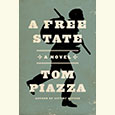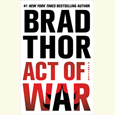No Graceland
Stephen Schottenfeld’s Bluff City Pawn explores the Great Recession’s impact on Memphis through the lens of a well-meaning pawn broker’s scheme to save his failing business
Huddy Marr, the protagonist of Stephen Schottenfeld’s debut novel, Bluff City Pawn, knows guns—and gold, and guitars, and jewelry. He also knows that the blood bank replacing the shuttered liquor store next door to his Memphis pawn shop signals the last, irreversible step in the decline of his particular neck of a slumping city. When he gets the opportunity to acquire a huge rare gun collection at a fraction of its worth, Huddy sees his chance to avert disaster. But to do so he will need to call in his brothers: Joe, a ruthless real-estate developer with his own problems, and ne’er-do-well Harlan, who can be trusted only to screw up.
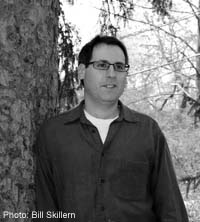 Bluff City Pawn shows a Memphis that tourists won’t find on Beale Street or at Graceland: a city on the verge, hammered by the Great Recession, its affluent residents steadily fleeing to the eastern suburbs and taking their tax dollars with them. Huddy Marr is a compelling representative of a working-class hero scrappily chasing the elusive American Dream, doing his best to keep his honor and dignity in a business not known for either. “Sure, some of what’s here is hot,” Schottenfeld writes of Huddy’s shop; “you can’t stop all of it, especially if no one’s gonna write down serial numbers, but he’s more often a buffer against crime, if anyone would ask him. The customer needs fast cash and they get a collateralized loan instead of robbing someone. The shops, Huddy would tell them, are stopping the crime.”
Bluff City Pawn shows a Memphis that tourists won’t find on Beale Street or at Graceland: a city on the verge, hammered by the Great Recession, its affluent residents steadily fleeing to the eastern suburbs and taking their tax dollars with them. Huddy Marr is a compelling representative of a working-class hero scrappily chasing the elusive American Dream, doing his best to keep his honor and dignity in a business not known for either. “Sure, some of what’s here is hot,” Schottenfeld writes of Huddy’s shop; “you can’t stop all of it, especially if no one’s gonna write down serial numbers, but he’s more often a buffer against crime, if anyone would ask him. The customer needs fast cash and they get a collateralized loan instead of robbing someone. The shops, Huddy would tell them, are stopping the crime.”
Huddy’s rationalizations may ring hollow to anyone who has ever been inside of one of Memphis’s seedier pawn shops. But Huddy is no crook—he keeps a meticulous log book, especially of gun sales, and labors mightily to stay within the law. Furthermore, he’s a bona fide rags-to- not-quite-riches story: the son of a single mother who worked as a grocery-store clerk.
A middle child, Huddy is flanked by two brothers who represent distinctly opposite outcomes for kids growing up poor in a city of declining fortunes. Older brother Joe, whose entrepreneurial ambition dates back to the landscaping business he built in his youth to help support his struggling family, has become a wealthy real-estate developer; younger brother Harlan is a hustler and scam artist who, as the novel opens, has just drifted back into town from Florida. Despite being the ostensible success story of the family, Joe is essentially the novel’s villain. He has made his real-estate fortune by taking advantage of white flight, building residential developments in the eastern suburbs. He owns the building that houses Bluff City Pawn, demanding timely rent checks from Huddy while simultaneously helping himself to the store’s inventory, depriving Huddy of valuable profits.
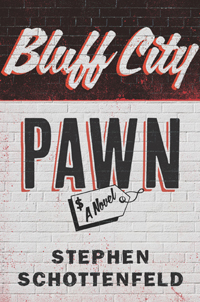 Joe lives in a suburban manse behind which he has built an elaborate water garden—a setting that Schottenfeld exploits to deft metaphorical effect:
Joe lives in a suburban manse behind which he has built an elaborate water garden—a setting that Schottenfeld exploits to deft metaphorical effect:
Joe clears the shade trees but then he’s screen again, big rocks blocking him and the high hedges and tall flowers a curtain of colors that he keeps coming through and slipping behind. They keep seeing more of him then less, here but not here, branches beetling down to take his face, then a clearing to see him whole until the spaces fill in again and the hedges get his legs so it looks like he’s floating or cut in two; then he’s broken up and flickering and gone, then the path straightens and unfills to show him once more whole. Harlan’s the one who’s been away, far off in Florida, but watching Joe weave through his backcountry, it’s like he’s returning too, from the Far East of Germantown, the other side of the world—and Huddy’s the only one who’s been stuck.
Huddy wants Joe to stake him for a move to a different location, away from the blood bank and the wrong kind of foot traffic that will come with it. Joe won’t do it, but then, as if delivered through prayer, an opportunity presents itself in the form of a massive and fabulously valuable gun collection. A wealthy former client has died, and his genteel widow wants to dispose of the guns with minimal complications. Huddy offers $100,000 cash, knowing he can flip the guns for three times that sum or more. The widow accepts, but even after liquidating as much of his property as possible, Huddy can come up with only half that amount. Joe won’t stake Huddy to move, but he’s eager to come in on the gun deal.
Of course, this is Memphis: nothing is ever as clear or as easy as it seems. Naively, Huddy brings Harlan in as well, exposing them all to greater risk. The gun collection contains a few surprises, too, and Joe turns out to be more desperate and ruthless than Huddy realized.
Once the gun-collection scheme takes center stage, Bluff City Pawn shifts from being solely a social-realist expose of a declining city into a suspenseful page-turner. Schottenfeld writes with penetrating authority about both the intricacies of the pawn business and the universal interfamilial conflicts that can lead a trio of brothers to turn on each other. Above all, Bluff City Pawn serves as a poignant love letter to a beautiful wreck of a city and a scathing critique of the forces aligned against her.
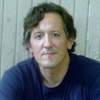
Ed Tarkington holds a B.A. from Furman University, an M.A. from the University of Virginia, and a Ph.D. from the creative-writing program at Florida State University. His debut novel, Only Love Can Break Your Heart, is forthcoming from Algonquin Books. He lives in Nashville.

